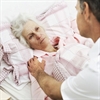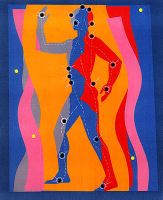 Breathlessness (aka dyspnea) is difficult to manage in palliative care.
Breathlessness (aka dyspnea) is difficult to manage in palliative care.
Researchers in the UK reviewed and ranked the most effective nonpharmacological strategies. Continue reading Nonpharmacological strategies for breathlessness
 Breathlessness (aka dyspnea) is difficult to manage in palliative care.
Breathlessness (aka dyspnea) is difficult to manage in palliative care.
Researchers in the UK reviewed and ranked the most effective nonpharmacological strategies. Continue reading Nonpharmacological strategies for breathlessness
![]() Researchers at the University of British Columbia, in Vancouver, compared acupuncture to nurse-led supportive care in patients with incurable cancer. Continue reading Is there benefit from acupuncture in palliative care?
Researchers at the University of British Columbia, in Vancouver, compared acupuncture to nurse-led supportive care in patients with incurable cancer. Continue reading Is there benefit from acupuncture in palliative care?
 Patients with advanced cancer frequently use CAM.
Patients with advanced cancer frequently use CAM.
Researchers at the University of Toronto, in Canada, examined the use of CAM and implications for patient care. Continue reading Spirituality as a guide to care in advanced cancer
![]() The conventional view of family caregivers highlights their burdens.
The conventional view of family caregivers highlights their burdens.
Researchers from Singapore found that caregivers may also find “meaning and enrichment in their caregiving journey.” Continue reading Growth through caregiving
![]() Patients with metastatic non–small-cell lung cancer have substantial symptoms and may receive aggressive care at the end of life.
Patients with metastatic non–small-cell lung cancer have substantial symptoms and may receive aggressive care at the end of life.
Researchers at Massachusetts General Hospital, in Boston, report improvement with earlier initiation of palliative care. Continue reading Starting palliative care earlier in lung cancer patients
![]() Researchers at Barts and the London School of Medicine and Dentistry, in the UK compared the relationship between religious faith and controversial decisions during care of dying patients. Continue reading Effect of religious faith on decisions by doctor providing end-of-life care
Researchers at Barts and the London School of Medicine and Dentistry, in the UK compared the relationship between religious faith and controversial decisions during care of dying patients. Continue reading Effect of religious faith on decisions by doctor providing end-of-life care
![]() This Cochrane review examined the effects of music therapy on end-of-life care. Continue reading Review of music therapy for end-of-life care
This Cochrane review examined the effects of music therapy on end-of-life care. Continue reading Review of music therapy for end-of-life care
 Many people believe it “increases the patients’ emotional distress.”
Many people believe it “increases the patients’ emotional distress.”
To the contrary, researchers from the Dana-Farber Cancer Institute in Boston report, “such conversations can actually lead to improved quality of life — both for patients and their loved ones.” Continue reading Discussing end-of-life issues with patients
 Medical News Today reports on this study in the journal, Psychological Science.
Medical News Today reports on this study in the journal, Psychological Science.
Apparently, “older people who spent at least 14 hours a week taking care of a disabled spouse lived longer than others” who spent less time or no time, according to researchers at the University of Michigan. Continue reading Beneficial health effects of care giving
![]() GeriPal is rethinking advanced care planning (ACP).
GeriPal is rethinking advanced care planning (ACP).
Rather than focusing on making prespecified decisions, ACP should help patients and their families make the best possible in-the-moment decisions. Continue reading Advanced care planning: Accounting for changing perspectives
![]() Gabriela Kaplan is an oncology clinical nurse specialist at Trinitas Regional Medical Center in Elizabeth, New Jersey. She specializes in end-of-life care.
Gabriela Kaplan is an oncology clinical nurse specialist at Trinitas Regional Medical Center in Elizabeth, New Jersey. She specializes in end-of-life care.
Here’s just a small part of her Medscape interview. Continue reading What’s the difference between palliative and hospice care?
![]() Researchers from the VA Connecticut Healthcare System, in West Haven tell us, “Outpatient palliative care can provide significant benefits to seriously ill patients, but several barriers to appropriate referrals remain.â€
Researchers from the VA Connecticut Healthcare System, in West Haven tell us, “Outpatient palliative care can provide significant benefits to seriously ill patients, but several barriers to appropriate referrals remain.â€
Will grandma’s doctor consider outpatient palliative care for her? Continue reading Predicting doctors who refer to palliative care
 Of the many symptoms experienced by those at the end of life, pain is one of the most common, feared, and often undertreated,
Of the many symptoms experienced by those at the end of life, pain is one of the most common, feared, and often undertreated,
Dr. Perry Fine from the University of Utah in Salt Lake City reviews the treatment options, including CAM. Here’s a summary. Continue reading CAM options to treat pain at the end of life
 Â Massage is a popular adjunct to cancer palliation.
 Massage is a popular adjunct to cancer palliation.
And, Prof. Ernst says “the evidence is encouraging. Continue reading Massage therapy for cancer palliative care
 Another result from Tuesday’s US election — 63% of voters in Michigan approved of letting people who are ill grow their own pot. Continue reading Michigan voters say OK to medical marijuana
Another result from Tuesday’s US election — 63% of voters in Michigan approved of letting people who are ill grow their own pot. Continue reading Michigan voters say OK to medical marijuana
 Â The authors review current palliative medicine, hospice, and end-of-life research. Continue reading Have you discovered Pallimed.org?
 The authors review current palliative medicine, hospice, and end-of-life research. Continue reading Have you discovered Pallimed.org?
 Â Researchers from the Calvary Health Care Bethlehem in Melbourne, Australia studied the effectiveness of a single music therapy session in reducing anxiety among terminally ill patients. Continue reading Music to manage anxiety during palliative care
 Researchers from the Calvary Health Care Bethlehem in Melbourne, Australia studied the effectiveness of a single music therapy session in reducing anxiety among terminally ill patients. Continue reading Music to manage anxiety during palliative care
 Â Small studies suggest that massage therapy may relieve pain and other symptoms.
 Small studies suggest that massage therapy may relieve pain and other symptoms.
Here are results from a large study. Continue reading Comparing benefits of massage vs touch in cancer patients
 Two white physicians simply sat for a time and respectfully and attentively conversed about end-of-life care with 23 terminally ill Black patients at Grady Memorial Hospital in Atlanta Georgia. Almost every patient willingly brought up spirituality.
Two white physicians simply sat for a time and respectfully and attentively conversed about end-of-life care with 23 terminally ill Black patients at Grady Memorial Hospital in Atlanta Georgia. Almost every patient willingly brought up spirituality.
In their article based on this experience they conclude that to understand and show respect for patients’ spiritual views in the context of the patient doctor relationship are keys to providing excellent palliative care.
Here are some quotes from their experience.
Continue reading Learning to apply spirituality to end-of-life care
 If the state of Washington is any indication, CAM therapies play a significant role in hospice care.
If the state of Washington is any indication, CAM therapies play a significant role in hospice care.
Survey results presented during the North American Research Conference on Complementary & Integrative Medicine reveal that more than a dozen different CAM therapies are offered through hospice care in Washington, with massage, music therapy, and energy healing used most often.